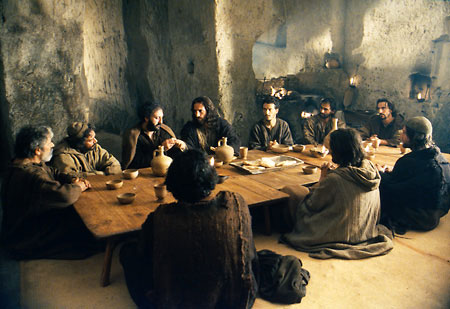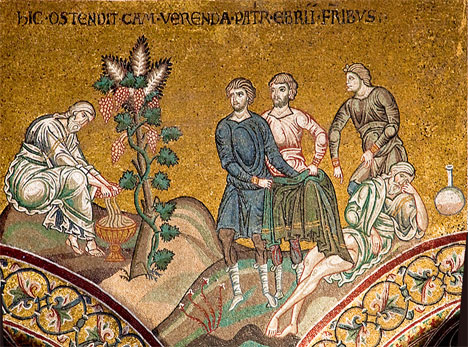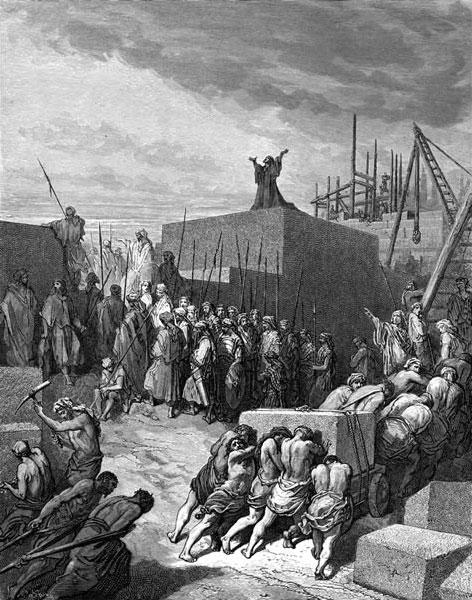Nov
11
2013

“The Lord’s Table is for dangerous people.”
If you are going to baptize infants, it makes sense that you would also allow them to take Communion. Baptism brings one into the priesthood (through the Laver) to the court of God, and Communion is fellowship in the priestly kingdom. To unite the two is consistent—as consistent as the two pillars flanking the threshold of Solomon’s Temple.
Continue reading
Comments Off | tags: Baptism, Circumcision, Communion, Ecclesiology, Federal Vision, God's Kitchen, James Jordan, John, Lampstand, Passover, Sacraments, Tim Gallant | posted in Biblical Theology
Nov
5
2013

or Semina Divina
And Jesus, perceiving in himself that power had gone out from him, immediately turned about in the crowd and said, “Who touched my garments?” (Mark 5:30)
We aren’t told in Genesis 9 what Ham’s intention was when he “uncovered” his father, Noah. Peter Leithart and James Jordan both present some fascinating insights (which differ from each other), but perhaps there is a solution elsewhere in Genesis, which, combined with both these possibilities, offers something new.
This post has been slain and resurrected for inclusion in Praxeme: Journal of Systematic Typology.
Continue reading
Comments Off | tags: Abraham, Ark of the Covenant, Covenant curse, Covenant Theology, Genesis, James Jordan, Literary Structure, Moses, Noah, Peter Leithart | posted in Bible Matrix, Biblical Theology
Oct
30
2013

“And as he prayed, the appearance of his countenance was altered, and his clothing was white and glistening.” (Luke 9:29, King James 2000 Bible)
The Tabernacle was covered in three layers: linen, red-dyed ramskin, and a third layer of tachash. What’s tachash? The word is a mystery, and there have been many suggestions concerning its meaning, from unicorn to dolphin. But perhaps that mystery has now been solved. And the glistening solution is nothing like you’d imagine in a million years.
This post has been slain and resurrected for inclusion in my 2015 book of essays, Inquietude.
Continue reading
3 comments | tags: Baptism, Esther, Exodus, Ezekiel, High Priest, James Jordan, Job, Leviathan, Tabernacle, Temple | posted in Bible Matrix, Biblical Theology, Creation, Quotes
Oct
14
2013

Busts of Vespasian and Titus in the British Museum
or The Coming of the Father and the Son
The chief priests answered,
“We have no king but Caesar.”
So he delivered him over to them to be crucified.
(John 19:15-16)
Is there any significance in the fact that apostate Jerusalem was destroyed by two generals, a father and a son, founders of a new Roman dynasty?
Continue reading
Comments Off | tags: AD70, Covenant Theology, Daniel, James Jordan, Revelation | posted in Bible Matrix, Biblical Theology, Quotes, The Last Days, The Restoration Era
Sep
28
2013

“God’s word is His presence, when delivered in a true setting.”
Continue reading
Comments Off | tags: Angels, Haggai, James Jordan, Prayer, Psalms, Stephen, Temple, Zechariah | posted in Biblical Theology, Quotes, The Restoration Era
Sep
8
2013

“Whoever sheds the blood of man,
by man shall his blood be shed,
for God made man in his own image.”
(Genesis 9:6)
James Jordan’s contribution to the study of any particular book of the Bible is invaluable, but the most important is very likely his work on Genesis. Because spineless modern theologians are unwilling to stand for its complete veracity, and yet very willing to jettison basic logic, they often miss the significance of its early chapters for the rest of the Bible and of history.
Continue reading
Comments Off | tags: cherubim, Genesis, James Jordan, Noah, Psalms, Seraphim | posted in Bible Matrix, Biblical Theology, Ethics, The Last Days
Aug
6
2013
 Concerning James Jordan’s “maximalist hermeneutic,” Ros Clarke writes:
Concerning James Jordan’s “maximalist hermeneutic,” Ros Clarke writes:
In order to begin to grasp the depths of meaning contained within the text of the Bible, we need to become more like its ancient readers. For Jordan this involves becoming more alert to the kind of literary structures and devices that shape the text. He also notes that the Bible was originally intended to be heard, rather than read silently, and that this would promote greater awareness of the patterns and meanings of the text:
Continue reading
3 comments | tags: Greg Bahnsen, James Jordan | posted in Biblical Theology, Quotes
Jul
16
2013
 “When Moses slew the Egyptian, he was doing the will of God but not with the power of God.”
“When Moses slew the Egyptian, he was doing the will of God but not with the power of God.”
Numbers 12:3 says that Moses was the meekest man “on the face of the ground [adamah].”
Psalm 37:11 says the meek will inherit the Land [eretz] and delight in abundant prosperity.
Isaiah 11:4 says that
with righteousness [God] shall judge the poor,
and decide with equity for the meek of the Land;
and he shall strike the Land with the rod of his mouth,
and with the breath of his lips she shall kill the wicked.
Firstly, what is meekness? And secondly, why is it connected to “face of the ground” (Adam), or Land?
This post has been slain and resurrected for inclusion in my 2015 book of essays, Inquietude.
Continue reading
Comments Off | tags: Ascension, Firstfruits, Genesis, Herod, Isaiah, James Jordan, Matthew, Moses, Pharaoh, Tabernacle | posted in Bible Matrix, Biblical Theology, Christian Life, Ethics, Quotes, The Last Days
Jun
29
2013
Comments Off | tags: James Jordan, Ralph Smith | posted in Biblical Theology
Jun
22
2013

“The reason literature, like art, has no hard-and-fast rules, is because authors and artists confer meaning upon things as they go.”
Recently on the hermeneutics exchange, Monica Cellio (one of the bright lights, whose eyes are like lasers) asked,
Do any principles commonly used in the field of hermeneutics have any counterparts in scientific principles? Is there a corollary in hermeneutics to the requirements that science demands as far as the reproducibility of experiments, peer review of results, etc?
This is a fantastic question, not because it will lead us towards a better understanding of the Bible, but because it exposes the reason why modern academics have such a problem with understanding and teaching the Bible.
Continue reading
3 comments | tags: Hermeneutics, James Jordan | posted in Biblical Theology, Quotes, Reading the Bible in 3D


































